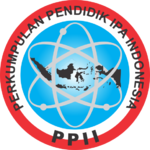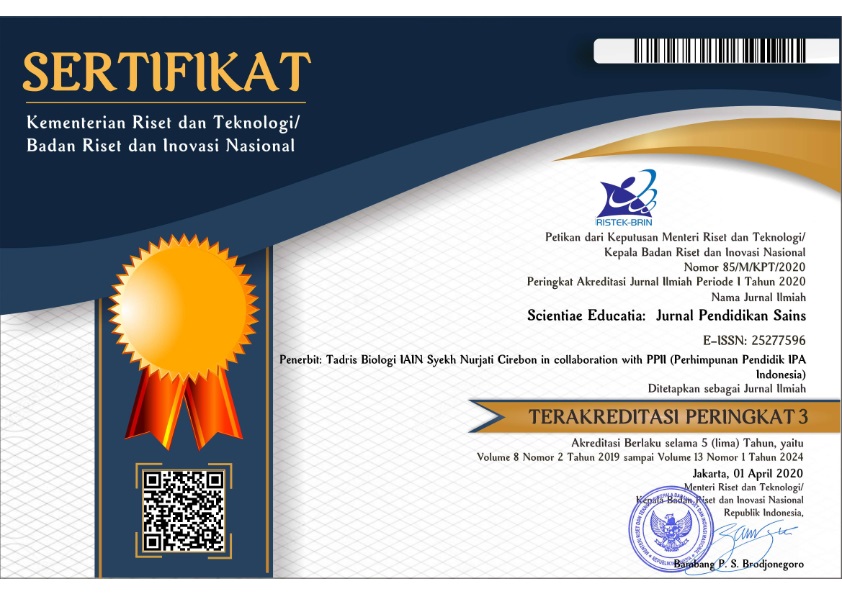STEM Approach to 4C Skills in Elementary School Students: A Systematic Literature Review
(1) Pendidikan Guru Sekolah Dasar, Fakultas Pendidikan dan Sains, Universitas Swadaya Gunung Jati, Kota Cirebon, Indonesia
(2) Pendidikan Guru Sekolah Dasar, Fakultas Pendidikan dan Sains, Universitas Swadaya Gunung Jati, Kota Cirebon, Indonesia
(3) Pendidikan Guru Sekolah Dasar, Fakultas Pendidikan dan Sains, Universitas Swadaya Gunung Jati, Kota Cirebon, Indonesia
(4) Pendidikan Guru Sekolah Dasar, Fakultas Pendidikan dan Sains, Universitas Swadaya Gunung Jati, Kota Cirebon, Indonesia
(5) Pendidikan Guru Sekolah Dasar, Fakultas Pendidikan dan Sains, Universitas Swadaya Gunung Jati, Kota Cirebon, Indonesia
(*) Corresponding Author
Abstract
Keywords
References
ASTUTI, N., Riswandi, EFENDI, U., & UTAMI, N. R. (2021). Implementation of science technology engineering and mathematics approach in learning to critical thinking skills of fifth-grade elementary school students in Lampung Province Science Learning and Teaching, 21(1). http://repository.lppm.unila.ac.id/41675/1/Nelly Astuti et.al_Jurnal Asia Pacific.pdf
Cahyana, C., Hamdu, G., Lidinillah, D. A. M., & Apriliya, S. (2020). Electrical Tandem Roller (ETR) Media for 4C Capabilities Based Stem Learning Elementary Schools. International Journal of Elementary Education, 4(2), 169. https://doi.org/10.23887/ijee.v4i2.25205
Dilmen, I., & Atalay, N. (2021). The Effect of the Augmented Reality Applications in Science Class on Students’ 21st Century Skills and Basic Skills. Journal of Science Learning, 4(4), 337-346. https://doi.org/10.17509/jsl.v4i4.32900
Fiorintina, E., Sukmaningrum, A., Rohana, S., & Rahayaan, F. (2023). Stem Approach in Supporting 21st Century Digitalization Era Learning at Elementary School Level. Proceedings of the National Seminar on Research and Service Results, 2022, 3078-3085. https://snhrp.unipasby.ac.id/prosiding/index.php/snhrp/article/view/901%0Ahttps://snhrp.unipasby.ac.id/prosiding/index.php/snhrp/article/download/901/836
Guven, İ., & Alpaslan, B. (2022). Investigation of the Effects of Interdisciplinary Science Activities on 5th Grade Students’ Creative Problem Solving and 21 st Century Skills. TOJET: The Turkish Online Journal of Educational Technology, 21(1), 80-96. https://www.oxfordlearnersdictionaries.com
Hanif, S., Wijaya, A. F. C., & Winarno, N. (2019). Enhancing Students’ Creativity through STEM Project-Based Learning. Journal of Science Learning, 2(2), 50. https://doi.org/10.17509/jsl.v2i2.13271
Ilma, A.Z., Wilujeng, I., Widowati, A., Nurtanto, M., Kholifah, N. (2023). A Systematic Literature Review of STEM Education in Indonesia (2016-2021): Contribution to Improving Skills in 21st Century Learning. Pegem Egitim ve Ogretim Dergisi, 13(2), 134-146. https://doi.org/10.47750/pegegog.13.02.17
Scientific, J., Fkip, P., Mandiri, U., Print, I., & Online, I. (2023). 4C COMPETENCIES IN THE IMPLEMENTATION OF THE EMPOWERING KURIKULUM IN CLASS IV OF Sri's BASIC SCHOOL. 09, 5202-5210.
Imam Muslim, R., Akrom, M., Tri Wuryani, M., Bagus Primadoni, A., & Kusumawati, D. (2023). The Effect of STEM-PJBL Approach on Critical Thinking Skills of Elementary School Students. LAMBDA: Scientific Journal of Mathematics and Natural Sciences Education and Its Applications, 3(3), 131-139. https://doi.org/10.58218/lambda.v3i3.724
Irmayani, O., Lidinillah, D. A. M., & Putri, A. R. (2023). Developing STEM Learning Design with Mini Projector Media in Grade V of Elementary School. Cendekia Journal: Journal of Mathematics Education, 7(3), 2688-2702. https://doi.org/10.31004/cendekia.v7i3.2680
Karimah, F., & Wulandari, F. (2023). The Effect of STEM-Integrated Project-Based Learning on Elementary School Students' Science Literacy Skills. Journal of Science Education Research, 9(11), 10446-10456. https://doi.org/10.29303/jppipa.v9i11.4171
Khalishah, N., & Mahmudah, U. (2022). Analysis of STEM (Science, Technology, Engineering, And Mathematics) Learning Development on 21st Century Skills. Proceedings of Santika 2: National Seminar on Mathematics Tadris UIN K.H. Abdurrahman Wahid Pekalongan, 2, 417-431.
Kurt, M., & Benzer, S. (2020). An Investigation on the Effect of STEM Practices on Sixth Grade Students’ Academic Achievement, Problem Solving Skills, and Attitudes towards STEM. Journal of Science Learning, 3(2), 79-88. https://doi.org/10.17509/jsl.v3i2.21419
Lestari, T. P., & Sarwi & Sri, S. . (2018). STEM-Based Project Based Learning Model to Increase Science Process and Creative Thinking Skills of 5 th Grade. Journal of Primary Education, 7(1), 18-24. http://journal.unnes.ac.id/sju/index.php/jpe
Oktavia, Z., & Ridlo, S. (2020). Critical Thinking Skills Reviewed from Communication Skills of the Primary School Students in STEM-Based Project-Based Learning Model. Journal of Primary Education, 9(3), 311-320. https://doi.org/10.15294/jpe.v9i3.27573
Rahayu, A. S., & Maryani, I. (2023). STEM-PjBL and creativity of science learning students in elementary schools. Journal of Professional Teacher Education, 1(2), 72-83. https://doi.org/10.12928/jprotect.v1i2.640
Ramdhani, A. (2021). Benefits of Information Technology on Employee Performance: A Systematic Literature Review (SLR). Chemistry, 1-15. http://onlinelibrary.wiley.com/doi/10.1002/cbdv.200490137/abstract%0Ahttp://repository.stiedewantara.ac.id/id/eprint/2499
Rusminati, S. H., & Juniarso, T. (2023). Literature Study: STEM to Foster 21st Century Skills in Elementary Schools. Journal on Education, 5(3), 10722-10727. https://doi.org/10.31004/joe.v5i3.1974
Sasangbong, S., & Huntula, J. (2022). Development creativity of grade 5 students on electricity through STEM education. Journal of Physics: Conference Series, 2145(1). https://doi.org/10.1088/1742-6596/2145/1/012076
Sulistia, S., Lidinillah, D. A. M., Nugraha, A., & Karlimah, K. (2019). Promoting engineering for fourth-grade students through STEM learning. Journal of Physics: Conference Series, 1318(1), 0-6. https://doi.org/10.1088/1742-6596/1318/1/012054
Suripto, S., Fabirah, N. R., Nanna, A. W. I., & Bua, M. T. (2023). Science, Technology, Engineering, and Mathematics (Stem) in Exploring Students' Critical Thinking Skills. AKSIOMA: Journal of Mathematics Education Study Program, 12(1), 319. https://doi.org/10.24127/ajpm.v12i1.6044
Thovawira, F. A., Safitri, I., Supartik, S., Sitompul, N. N. S., & Anggriyani, I. (2021). Systematic Literature Review: Implementation of the Stem Approach (Benefits and Challenges) in Indonesia. HISTOGRAM: Journal of Mathematics Education, 4(2), 355-371. https://doi.org/10.31100/histogram.v4i2.682
Togou, M. A., Lorenzo, C., Lorenzo, E., Cornetta, G., & Muntean, G.-M. (2018). Raising Students’ Interest in Stem Education Via Remote Digital Fabrication: an Irish Primary School Case Study. EDULEARN18 Proceedings, 1(July), 2835-2840. https://doi.org/10.21125/edulearn.2018.0756
Ultay, N., Zıvalı, A., Yılmaz, H., Bak, H. K., Yılmaz, K., Topatan, M., & Kara, P. G. (2020). STEM-Focused Activities to Support Student Learning in Primary School Science. Journal of Science Learning, 3(3), 156-164. https://doi.org/10.17509/jsl.v3i3.23705
Wakhid, A., Zaenuri, Z., Sugiman, S., Isnarto, I., & Cahyono, A. N. (2023). Mathematical Creative Thinking Ability in STEM-Approach Learning. JIIP - Scientific Journal of Education Science, 6(5), 3545-3551. https://doi.org/10.54371/jiip.v6i5.1675
White, M. (2022). Investigating the Responses of Children in First Grade Engaged in STEM Lessons. Journal of Research in Education, 31(1), 1-26.
WINARNI, E. W., KARPUDEWAN, M., KARYADI, B., & GUMONO, G. (2022). Integrated PjBL-STEM in Scientific Literacy and Environment Attitude for Elementary School. Asian Journal of Education and Training, 8(2), 43-50. https://doi.org/10.20448/edu.v8i2.3873
Yavuz, Ü., & Duban, N. Y. (2021). Primary School Students ’ Interests on Professions and Opinions. International Technology and Education Journal, 5(1), 21-31.
Yusri, A. Z. and D. (2020). LITERATURE REVIEW: STEM IN ELEMENTARY SCHOOL LEARNING. Journal of Education Science, 7(2), 809-820.
Zaini Miftach. (2018). APPLICATION OF SCIENCE, TECHNOLOGY, ENGINEERING, MATHEMATICS (STEM) APPROACH TO IMPROVE CRITICAL THINKING SKILLS OF 5TH GRADE STUDENTS IN SCIENCE LEARNING. 08 (September), 53-54.
DOI: 10.24235/sc.educatia.v13i1.18062
Article Metrics
Abstract view : 2 timesRefbacks
- There are currently no refbacks.
Scientiae Educatia: Jurnal Pendidikan Sains indexed by:

This work is licensed under a Creative Commons Attribution 4.0 International License.
Stat Counter (Link)



1.png)












